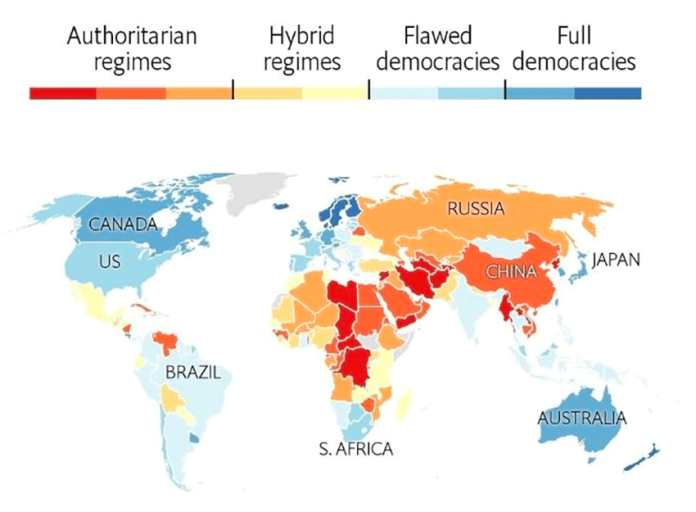Mexico took a step toward authoritarianism in 2021, according to a well-established democracy index. For the first time, the country was ranked as a “hybrid regime” rather than a “flawed democracy” in The Economist Intelligence Unit (EIU) 2021 Democracy Index.
The index assigns a score from one to 10 based on five categories: electoral process and pluralism, functioning of government, political participation, political culture, and civil liberties. It averages rankings by a variety of experts and incorporates public opinion surveys and voter turnout data.
Mexico scored 5.57 on the 2021 index, half a point lower than in 2020. The declining score is part of a trend: Mexico has lost points on the index in most years since 2010. In 2021, it tied with Ukraine for 86th place out of 167 countries.
A particularly low rating in the political culture category — just 3.13 points out of 10 — dragged down Mexico’s total. The score represents a low level of support for democratic values, and little resistance to the influence of authoritarian figures, military leaders or religious institutions.
But Mexico was far from alone in the supposed erosion of democracy. The average global score was 5.28, less than Mexico’s and a decline from the 2020 global score.
Democracy Index analysts attributed that decline in part to the pandemic. In both authoritarian and democratic countries, civil liberties have been curtailed in the name of public health (with or without the support of citizens). The pandemic has also entrenched divisions between those favoring the precautionary approach and those favoring less government interference, the EIU wrote.
Latin America’s average regional score also fell for the sixth consecutive year, to 5.83. The report attributed this, in part, to “illiberal populist” leaders like President López Obrador, Nayib Bukele of El Salvador and Brazil’s Jair Bolsonaro. It also mentioned a “growing scepticism about the ability of democratic governments to address the region’s problems and increasing tolerance of authoritarian governance” as a factor.
A major threat to Mexican democracy, according to the EIU, were López Obrador’s efforts to concentrate power in the executive branch, his accusations that electoral authorities and the press are biased against his government, and his increasing intolerance of criticism, even from allies. Along with the dangers posed by election narco-violence, “a further erosion of Mexico’s democracy is likely as the presidential election in 2024 moves closer,” the analysis concluded.
The Economist has presented unflattering information or opinions about the president on several occasions in the past; last May, an editorial comparing the president to an “authoritarian populist” was accompanied by a magazine covering depicting AMLO with the words, “Mexico’s false messiah.” López Obrador responded that the the coverage was propagandistic, rude and dishonest.
Some analysts have criticized the index for a lack of transparency about which experts contribute to the scoring. EIU is a private UK-based corporation, and a sister company to The Economist newspaper.
Mexico News Daily
